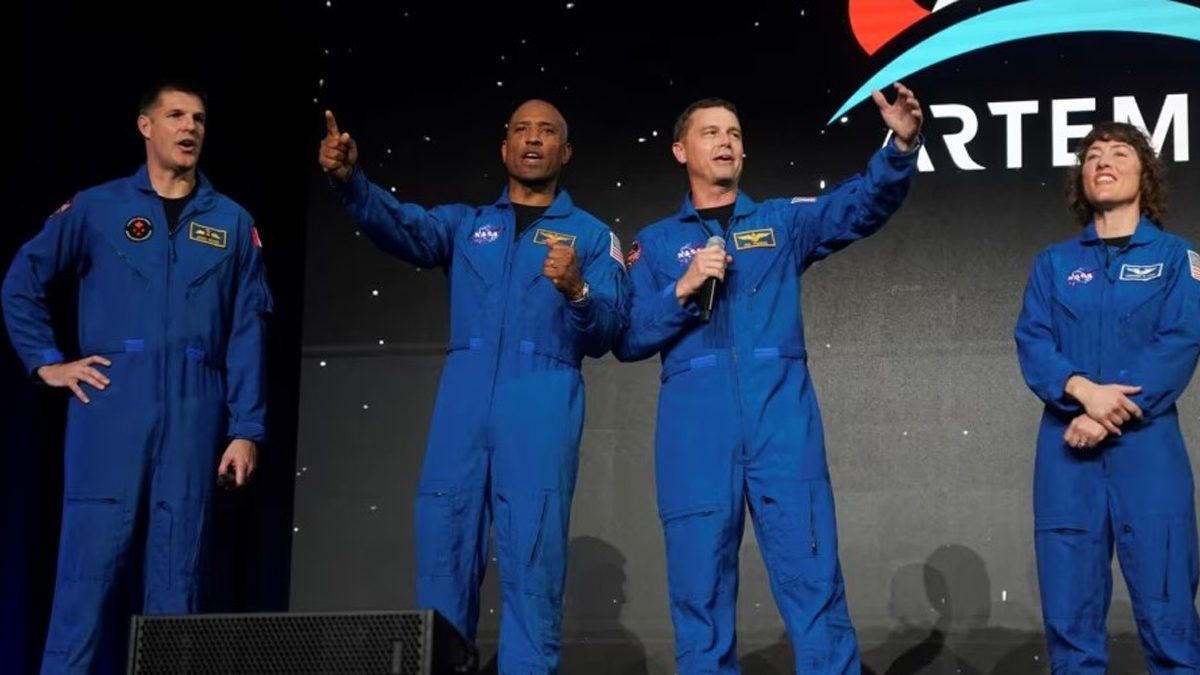
NASA announces diverse international crew for First Moon Mission since 1970s

TEXAS: “It’s been more than a half century since astronauts journeyed to the moon — that’s about to change,” said NASA Administrator Bill Nelson as he stood before the current astronaut corps as well as veterans of the Apollo and Space Shuttle programs at Johnson Space Center’s Ellington Field in Houston, Texas.
The crowd was gathered for the historic announcement of the crew for Artemis II — Christina Koch, Victor Glover, Reid Wiseman and Jeremy Hansen.
“This is humanity’s crew,” said Nelson, emphasizing the diverse makeup of the international crew, all in their 40s.
“We choose to go back to the moon and on to Mars, and we are going to do it together, because in the 21st century NASA explores the cosmos with international partners.”
International Space Station veteran Reid Wiseman is mission commander for Artemis II, while engineer Christina Koch and Canadian Jeremy Hansen will serve as mission specialists.
Hansen is the first international astronaut scheduled to launch on a mission to the moon, while Koch would make history as the first woman taking part in such a journey.
“Am I excited? Absolutely,” Koch said to the cheering audience during the announcement ceremony. “But my real question is: Are you excited?”
Victor Glover, a U.S. naval aviator, will pilot the Orion spacecraft carrying the crew on a 10-day roundtrip mission around the moon and back, testing the functions of the systems and equipment future crews will use to eventually return to the lunar surface.
In an exclusive interview with VOA during the uncrewed Artemis 1 mission last year, Glover said he embraces the opportunity to be the first person of color assigned to a moon mission.
“People keep asking me, ‘Is it meaningful to you that little Black kids look up to you and say they want to be like you?’ You know what? Let’s be honest, I represent America,” he told VOA.
“I’m a naval officer and I work for NASA. I represent America and little white kids, little Mexican kids, little Hispanic kids and little Iranian kids follow what we’re doing because this is maybe one of the most recognizable symbols in the universe,” he said pointing to the NASA patch on his blue flight suit.
“I think that that’s really important, and I take that very seriously.”
Not only is the crew makeup historic, those aboard Artemis II could also venture farther in space than any humans before them.
While the Artemis II crew won’t orbit or land on the lunar surface, they could travel more than 1 million total kilometers on a path that slingshots well beyond the moon before returning to Earth.
NASA says the exact distance and plan depends on a number of factors, including the date of the actual mission launch.
At the end of the NASA ceremony introducing his crew, astronaut Reid Wiseman expressed the determination of the agency to further its goals in space despite repeated delays and cost overruns.
“There’s three words we keep saying in this Artemis program, and that’s ‘We. Are. Going.’ And I want everyone to say it with me – We Are Going!”
NASA hopes to launch Artemis II as early as November 2024, with the first mission back to the lunar surface as early as 2025.
(VOA)











Comments